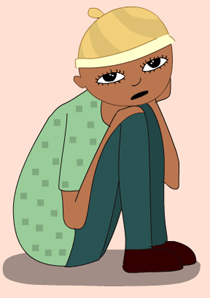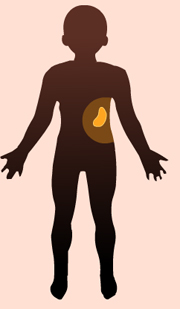Signs & Symptoms of sickle cell disease.
 Symptoms of sickle cell disease vary. It can be mild or severe. Most kids with sickle cell disease have some degree of anaemia and might develop one or more of the following conditions and symptoms as part of the disorder. Symptoms of sickle cell disease vary. It can be mild or severe. Most kids with sickle cell disease have some degree of anaemia and might develop one or more of the following conditions and symptoms as part of the disorder.
Let us now see some outward symptoms to look out for:
Anaemia – the sickle cells are more fragile and they die (dissolve) more easily than normal blood cells. This means you have fewer red blood cells to carry oxygen (air) around. As your body is not getting all the oxygen you need, you will feel tired, weak, and out of breath.
Hand-foot syndrome (dactylitis) – the sickle cells block the small blood vessels in the hands and feet of infants, causing them to swell. This is often the first symptom of sickle cell disease that people experience.
Jaundice – Jaundice is a yellowing of the skin and eyes caused by damage to the liver. The liver filters out harmful substances from your blood. As sickle cells die more easily, the liver has to deal with more dead cells than it can cope with.
Frequent infections – You are open to more infections because sickle cells can damage your spleen, which is the organ involved with cleaning your blood, destroying old red blood cells and fighting infection.
 This is where your spleen is located inside your body: Other organs such as the liver, kidney, lungs and heart become damaged, causing severe pain, especially in the bones. This is where your spleen is located inside your body: Other organs such as the liver, kidney, lungs and heart become damaged, causing severe pain, especially in the bones.
In summary, the symptoms are more evident as in below:
 Chest pain, abdominal pain, coughing, difficulty breathing and fever. Chest pain, abdominal pain, coughing, difficulty breathing and fever.
 Paleness, fatigue and rapid pulse. Paleness, fatigue and rapid pulse.
 Painful swelling of the hands and feet. Painful swelling of the hands and feet.
 Fevers of 101° F (38° C) or higher, could be signs of an infection. Children with sickle cell disease and fever should be seen by a doctor immediately. Fevers of 101° F (38° C) or higher, could be signs of an infection. Children with sickle cell disease and fever should be seen by a doctor immediately.
 Stroke: Signs can include headache, seizures, weakness of the arms and legs, speech problems, a facial droop, or loss of consciousness. Stroke: Signs can include headache, seizures, weakness of the arms and legs, speech problems, a facial droop, or loss of consciousness.
Look out for BEDWETTING: Bedwetting is known as enuresis.
Some of you may experience this frequently even in your teenage years. With sickle cell disorders the urine is very dilute. Don’t worry about this. There is a lot of help available. Don’t stop drinking plenty
 |
